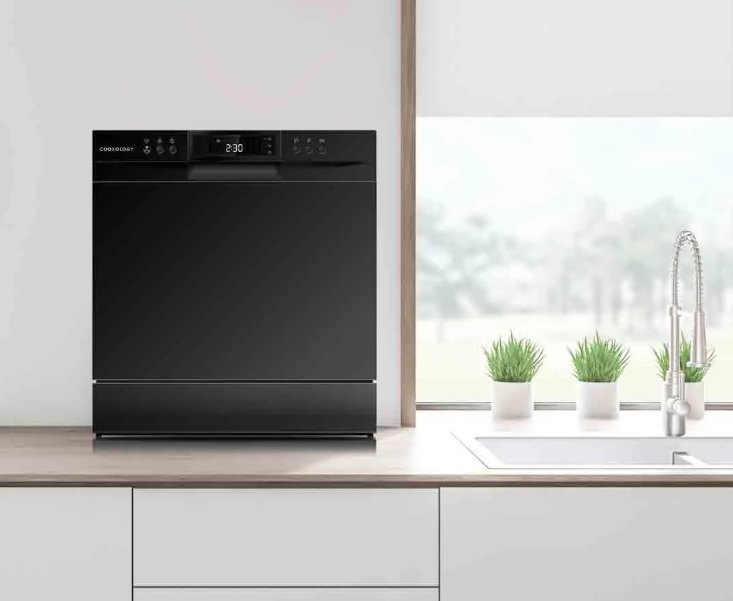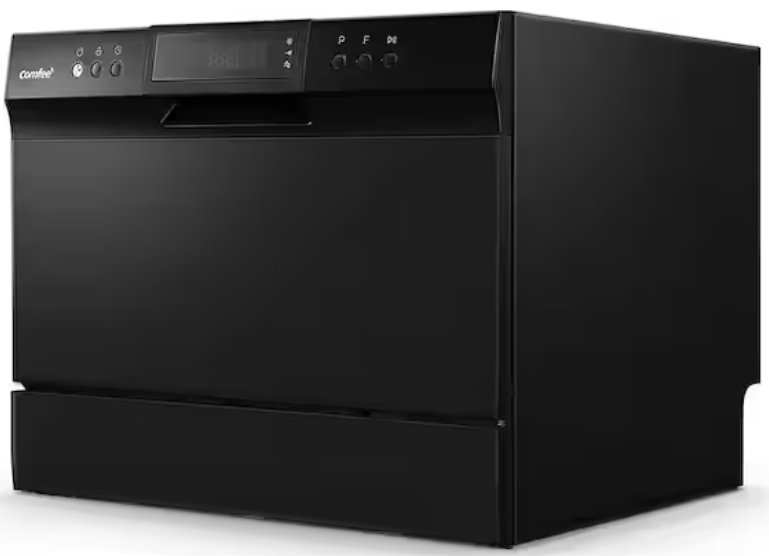
COMFEE CDC22P1BBB Countertop Dishwasher
IMPORTANT SAFETY INFORMATION
READ ALL INSTRUCTIONS BEFORE USING
GROUNDING INSTRUCTIONS
- This appliance must be grounded. In the event of a malfunction or breakdown, grounding will reduce the risk of electric shock by providing a path of least resistance to electric current. This appliance is equipped with a cord having an equipment-grounding conductor and a grounding plug.
- The plug must be plugged into an appropriate outlet that is installed and grounded by all local codes and ordinances.
WARNING!
- Improper connection of the equipment-grounding conductor can result in a risk of electric shock.
- Check with a qualified electrician or service representative if you are in doubt whether the appliance is properly grounded. Do not modify the plug provided with the appliance; If it is not fit for the outlet. Have a proper outlet installed by a qualified electrician.
WARNING! PROPER USE
- Do not abuse, sit on, or stand on the door or dish rack of the dishwasher.
- Do not touch the heating element during or immediately after use. (This instruction is only applicable to machines with a visual heating element.)
- Do not operate your dishwasher unless all enclosure panels are properly in place. Open the door very carefully if the dishwasher is operating, there is a risk of water squirting out.
- Please do not place any heavy objects or stand on the door when it is open. The appliance could tip forward.
- When loading items to be washed:
- Locate sharp items so that they are not likely to damage the door seal;
- Warning: Knives and other sharp-point utensils must be loaded in the basket with their points down or placed in a horizontal position.
- When using your dishwasher, you should prevent plastic items from coming into contact with the heating element. (This instruction is only applicable to machines with a visual heating element.)
- Check that the detergent receptible is empty after completion of the wash cycle.
- Do not wash plastic items unless they are marked dishwasher safe or the equivalent. For plastic items not so marked, check the manufacturer’s recommendations.
- Use only detergent and rinse additives designed for an automatic dishwasher.
- Never use soap, laundry detergent, or hand-washing detergent in your dishwasher. Keep these products out of the reach of children.
- Keep children away from detergent and rinse aid, and keep children away from the open door of the dishwasher, there could still be some detergent left inside.
- This appliance is not intended for use by persons (including children with reduced physical, sensory, or mental capabilities, or lack of experience and knowledge unless they have been given supervision or instruction concerning the use of the appliance by a person responsible for their safety.
- Children should be supervised to ensure that they do not play with the appliance.
- Dishwasher detergents are strongly alkaline, they can be extremely dangerous if swallowed. Avoid contact with skin and eyes and keep children from the dishwasher when the door is open.
- The door should not be left in the open position since this could present a tripping hazard.
- If the supply cord is damaged, it must be replaced by the manufacturer its service agent, or a similarly qualified person to avoid a hazard.
- Remove the door to the washing compartment when removing an old dishwasher from service or discarding it.
- Please dispose of packing materials properly.
- Use the dishwasher only for its intended function.
- During installation, the power supply must not be excessively or dangerously bent or flattened. Do not tamper with controls.
- The appliance is to be connected to the water mains using new hose sets and that old hose sets should not be reused.
- The maximum number of place settings to be washed is 6.
- The maximum permissible inlet water pressure is 1MPa.
- The minimum permissible inlet water pressure is 0.04MPa.
Attention
The installation of the pipes and electrical equipment should be done by professionals.
Operation Instruction
IMPORTANT
To get the best performance from your dishwasher, read all operating instructions before using it for the first time.

- Power Button: To turn on/off the power supply.
- Child lock function: Press the Child button to lock the program;
- Delay Button: To press the button to delay.
- Program Selector: Press the button to select wash cycles
- Function Selector: Select Extra drying, Extra cleaning, or Express.
- Start/Pause Button: Press this button to start or pause the dishwasher.
- Display Screen: To show the remaining time and the state(running state, delay time, etc).
- Extra Cleaning Indicator;
- Child Lock Indicator;
- Express Indicator;
- Water Faucet Indicator;
- Program Indicator Light
- Extra Drying Indicators: To show the Extra drying function
- Rinse Aid Warning Light: To be on when the rinse aid dispenser needs to be refilled.
- Program Ending Indicator
Dishwasher Features
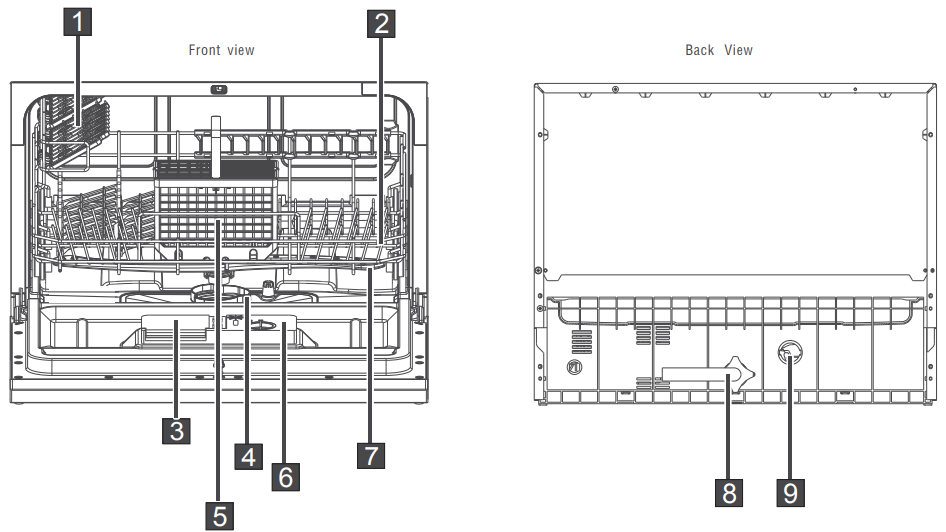
- Cup Shelf
- Basket
- Detergent Dispenser
- Filter Assembly
- Cutlery Basket
- Rinse Aid Dispenser
- Spray Arms
- Inlet Pipe Connector
- Drain Pipe Connector
Before First Use
Fill the Rinse Aid Dispenser
Rinse Aid Dispenser
The rinse aid is released during the final rinse to prevent water from forming droplets on your dishes. That can leave spots and streaks. It also improves drying by allowing water to slide off the dishes. Your dishwasher is designed to use liquid rinse aids. The rinse aid dispenser is located inside the door next to the detergent dispenser. To fill the dispenser, open the cap and pour the rinse aid into the dispenser until the level indicator turns completely black. The volume of the rinse aid container is about 110ml.
Function of Rinse Aid
Rinse aid is automatically added during the last rinse, ensuring thorough rinsing, and spot and streak-free drying.
Attention!
Only use a branded rinse aid for the dishwasher. Never fill the rinse aid dispenser with any other substances (e.g. Dishwasher cleaning agent, liquid detergent). This would damage the appliance.
When to Refill the Rinse Aid Dispenser
The Rinse Aid warning indicator icon illuminates when the rinse aid level is low. Rinse Aid should be added to the Rinse Aid dispenser.
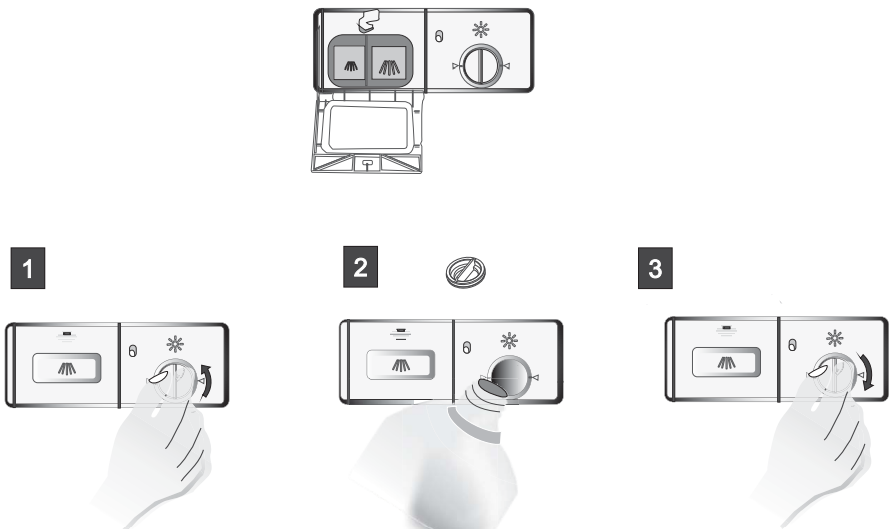
- To open the dispenser, turn the cap to the “open” (left) arrow and lift it out.
- Pour the rinse aid into the dispenser, being careful not to overfill.
- Replace the cap by inserting it aligned with the “open” arrow and turning it to the closed (right) arrow.
NOTE:
Clean up any rinse aid spilled during filling with an absorbent cloth to avoid excessive foaming during the next wash. Don’t forget to replace the cap before you close the dishwasher door.
Adjusting Rinse Aid Dispenser
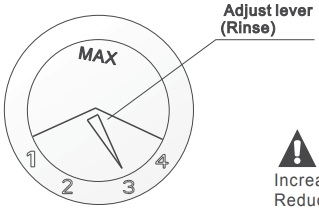
The rinse aid dispenser has four settings. The recommended setting is on “3”. If the dishes still are not drying properly or are spotted, adjust the dial to the next higher number on “4”.
NOTE
Increase the dose if there are drops of water or lime spots on the dishes after washing. Reduce it if there are sticky whitish stains on your dishes or a bluish film on glassware or knife blades.
Function of Detergent
Proper Use of Detergent
Detergents with their chemical ingredients are necessary to remove dirt, crush dirt, and transport it out of the dish Use only detergent specifically made for use in dishwashers. Keep your detergent fresh and dry. Don’t put powder detergent into the dispenser until you’re ready to wash dishes.
Detergents
There are 3 sorts of detergents
- With phosphate and chlorine
- With phosphate and without chlorine
- Without phosphate and chloride
Normally new pulverised detergent is without phosphate. The water softener function of phosphate is not given. In this case, we recommend filling the salt in the salt container even when the hardness of the water is only 6°dH. If detergents without phosphate were used in case of hard water often white spots appeared on dishes and glasses. In this case please add more detergent to reach better results. Detergents without chlorine do only bleach a little. Strong and coloured spots will not removed completely. In this case please choose a program with higher Temperature.
Concentrated Detergent
Based on their chemical composition, dishwashers can be split into two basic types:
- conventional, alkaline detergents with caustic components
- Low-alkaline concentrated detergents with natural enzymes
The use of a “normal” washing program in conjunction with concentrated detergents reduces pollution and is good for your dishes; these wash programs are specially matched to the dirt-dissolving properties of the enzymes of the concentrated detergent. For this reason “normal” wash program in which concentrated detergents are used can achieve the same results that can otherwise only be achieved using a “heavy” program.
Detergent Tablets
Detergent tablets of different brands dissolve at different speeds. For this reason, some detergent tablets cannot dissolve and develop their full cleaning power during a short program. Therefore please use a long program when using detergent tablets, to ensure the complete removal of detergent residuals.
Detergent Dispenser
The dispenser must be refilled before the start of each wash cycle following the instructions provided in the Wash Cycle Table. Your dishwasher uses less detergent and rinse aid than a conventional dishwasher. Generally, only one tablespoon of detergent is needed for a normal wash load. Also, more heavily soiled items need more detergent. Always add the detergent just before starting the dishwasher, otherwise it could get damp and will not dissolve properly.
Amount of Detergent to Use
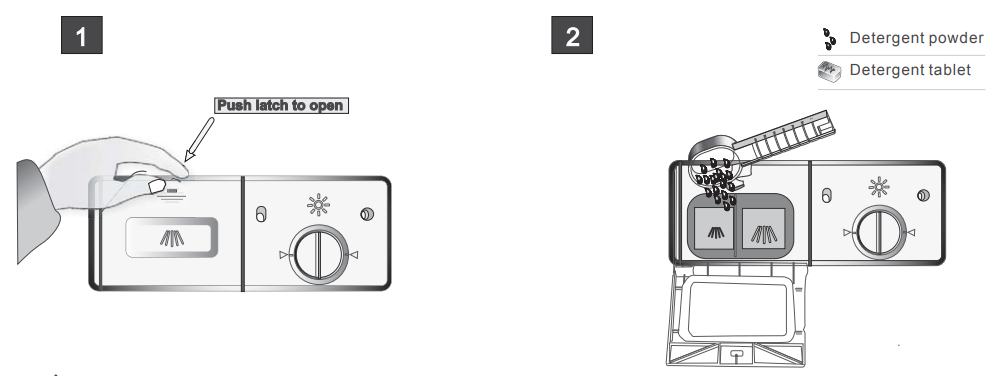
NOTE
- If the lid is closed: press the release button. The lid springs open.
- Always add the detergent just before starting each wash cycle.
- Only use branded detergent aid for dishwashers.
WARNING!
Dishwasher detergent is corrosive! Take care to keep it out of reach of children.
Fill in detergent
Fill the detergent dispenser with detergent. The marking indicates the dosing levels, as illustrated on the right:
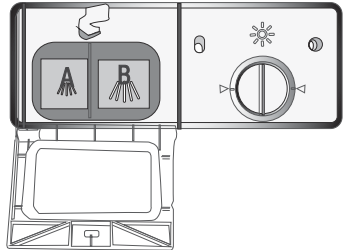
- Capacity-15g
- Capacity-25g
Please observe the manufacturer’s dosing and storage recommendations as stated on the detergent packaging. Close the lid and press until it locks in place. If the dishes are heavily soiled, place an additional detergent dose in the pre-wash detergent chamber. This detergent will take effect during the pre-wash phase.
NOTE
- You find information about the amount of detergent for the single program on the last page.
- Please be aware, that according to the level of soiling and the specific hardness of water, differences are possible.
- Please observe the manufacturer’s recommendations on the detergent packaging.
Loading the Dishwasher Baskets
Recommendation
- Consider buying utensils that are identified as dishwasher-proof.
- Use a mild detergent that is described as specially for dishware. If necessary, seek further information from detergent manufacturers.
- For particular items like glassware, select a program with a low temperature.
- To prevent damage, do not take glass and cutlery out of the dishwasher immediately after the program has ended.
Items Not Recommended For The Dishwasher
Are not suitable
- Cutlery with wooden, horn china, or mother-of-pearl handles
- Plastic items that are not heat-resistant
- Older cutlery with glued parts that are not temperature-resistant
- Bonded cutlery items or dishes
- Pewter or Cooper items
- crystal glass
- Steel items subject to rusting
- Wooden platters
- Items made from synthetic fibers
Are of limited suitability
- Some types of glasses can become dull after a large number of washes
- Silver and aluminum parts tend to discolor during washing
- Glazed patterns may fade if machine-washed frequently
Attention Before or After Loading The Dishwasher Baskets
(For best performance of the dishwasher, follow these loading guidelines. Features and appearance of baskets and cutlery baskets may vary from your model.). Scrape off any large amounts of leftover food. Soften remnants of burnt food in pans It is not necessary to rinse the dishes under running water.. Place objects in the dishwasher in the following way:
- Items such as cups, glasses, pots/pans, etc. are face down.
- Allen site is stake secureness, and not be var. should be loaded at a slant so that water can run off.
- All utensils are stacked securely and can not tip over!
- All utensils are placed in a way that the spray arms can rotated freely during washing.
NOTE
Very small items should not be washed in the dishwasher as they could easily fall out of the basket.
- Load hollow items such as cups, glasses, pans, etc. The opening is downwards so that water cannot collect in the container or a deep base.
- Dishes and cutlery must not lie inside one another, or cover each other.
- To avoid damage to glasses, they must not touch.
- Load large items that are most difficult to clean into the basket.
- Long-bladed knives stored in an upright position are a potential hazard!
- Long and/or sharp items of cutlery such as carving knives must be positioned horizontally in the basket.
- Please do not overload your dishwasher. This is important for good results and for reasonable energy consumption.
Loading the Basket
Position the dishes and cookware so that they will not get moved by the spray of water.
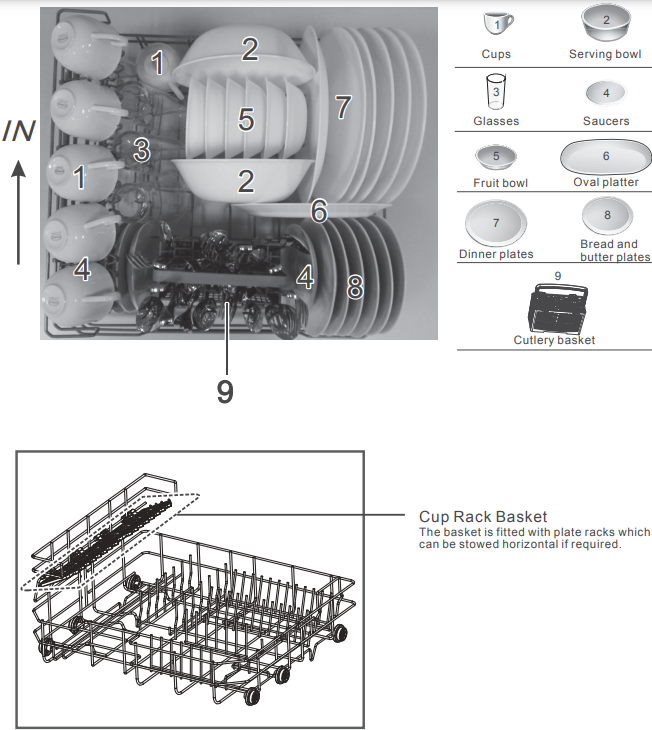
Cutlery Basket
Cutlery should be placed in the cutlery basket with handles at the bottom. If the rack has side baskets, the spoon should be loaded individually into the appropriate slots, especially long utensils should be placed in the horizontal position at the front of the upper basket as shown.
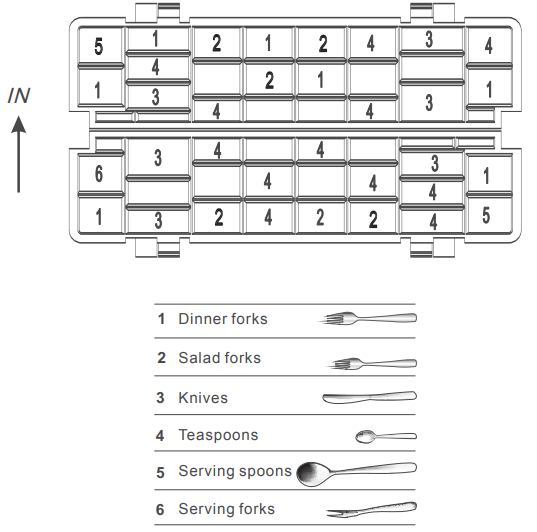
WARNING!
- Do not let any item extend through the bottom.
- Always load sharp utensils with the sharp point down!
For personal safety and a top-quality clean, place the silverware in the basket:
- So they do not nest together.
- With handles facing down.
- Sharp knives and other potentially dangerous utensils with handles facing up.
Starting a Washing Program
Wash Cycle Table
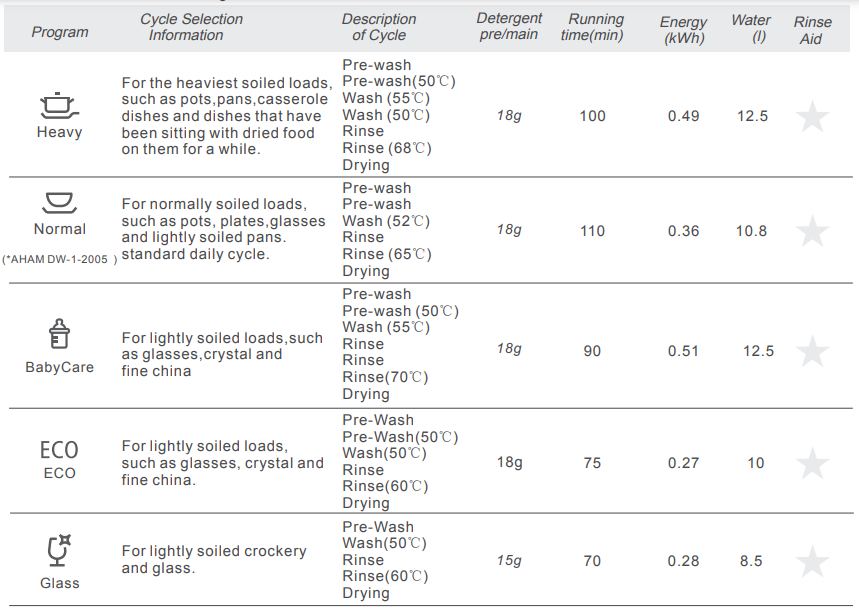

Turning On the Appliance
Starting a wash cycle:
- Draw out the basket(see the section entitled “Loading the Basket” );
- Pour in the detergent (see the section entitled “Detergent and Rinse Aid “);
- Insert the plug into the socket. The power supply is 120V/60 Hz;
- Make sure that the water supply is turned on to full pressure;
- Close the door and press the on/off button to turn on the power supply;
- Press the program button to select the wash program you need Heavy->Normal->BabyCare->ECO->Glass->Speed->Rinse->Mini-party
- Then press the Start/Pause button, until the dishwasher begins to start.
Change the Programs
Premise: You can modify the washing program at the beginning of the cycle. Otherwise, the detergent may have already been released, and the appliance may have already drained the wash water. If this is the case, the detergent dispenser must be refilled (see the section entitled ” Loading the Detergent” ).
To change the washing program, press the Start/pause button to pause the machine, then press the program button for more than three seconds to set the machine on standby, then you can (see the section entity the Starting a wash cycle The lights show the state of the dishwasher:
- All phase lights off——- Stand by
- The display is not blinking——Paused
- The display blinking——- Running
Forgot to Add a Dish?
A forgotten dish can be added any time before the detergent cup opens.
- Press the start/pause button
- Open the door a little to stop the washing.
- After the spray arms stop working, you can open the door completely.
- Add forgotten dishes.
- Close the door
- Press the start/pause button, the dishwasher will run after 10 seconds.
At the End of the Wash Cycle
When the working cycle has finished, the buzzer of the dishwasher will sound for 8 seconds, then stop. Turn off the appliance using the ON/OFF button, shut off the water supply, and open the door of the dishwasher. Wait a few minutes before unloading the dishwasher to avoid handling the dishes and utensils while they. are still hot and more susceptible to breakage. They will also dry better. Since the appliance is standing by, it will power off automatically after 30 minutes without any operation
Switch Off the Dishwasher
All the phase lights are off, only in this case, the program ended.
- Switch off the dishwasher by pressing the ON/OFF button.
- Turn off the water tap!
Open the door carefully.
Hot dishes are sensitive to cold shock. The dishes should therefore be allowed to cool down around 15 minutes before removing from the appliance. Open the dishwasher’s door, leave it ajar, and wait a few minutes before removing the dishes. In this way, they will be cooler and the drying will be improved.
Unloading the dishwasher
Normally, the dishwasher is wet inside.
Maintenance and Cleaning
Filtration System
The filter prevents larger remnants of food or other objects from getting inside the pump.
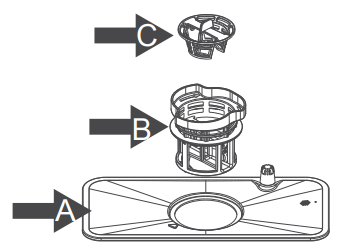
The filter system consists of a coarse filter, a flat (main filter), and a microfilter (fine filter).
Main filter A
Food and soil particles trapped by this filter are pulverized by a special jet on the spray arm and washed down to the drain.
Fine filter B
This filter holds soil and food residue in the sump area and prevents it from being deposited on the dishes during the wash cycle.
Coarse filter C
Larger items, such as pieces of bone or glass, that could block the drain are trapped in the coarse filter. To remove the items caught by the filter, gently squeeze the tap on the top of this filter and lift out.
Filter Assembly
The filter efficiently removes food particles from the wash water, allowing it to be recirculated during the cycle. For best performance and results, the filter assembly must be regularly cleaned. For this reason, it is a good idea to remove the larger food particles trapping in the filter after each wash cycle by rinsing the filter and cup under running water. To remove the filter assembly, pull on the cup handle in the upward direction.
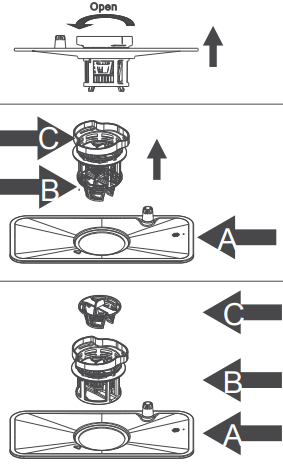
- Step1
Twist the filter assembly(A, B, and C) counterclockwise, then lift it all. - Step2
Lift B and C from A; - Complete
Remarks
- Inspect the filters for blocking every time the dishwasher has been used.
- By unscrewing the coarse filter, you can remove the filter system. Remove any food remnants and clean the filters under running water.
Cleaning The Filter
To clean the coarse filter and the fine filter, use a cleaning brush. Reassemble the filter parts as shown in the figures on the last page and reinsert the entire assembly in the dishwasher, positioning it in its seat and pressing downward.
WARNING!
When cleaning the filters, don’t knock on them. Otherwise, the filters could be contorted which could negatively impact dishwasher performance.
Caring for the Dishwasher
The control panel can be cleaned by using a lightly dampened cloth and dry thoroughly. The exterior uses a good appliance polish wax. Never use sharp objects, scouring pads, or harsh cleaners on any part of the dishwasher.
Cleaning The Door
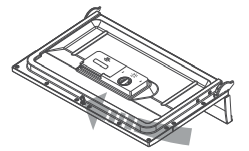
To clean the edge around the door, you should use only a soft warm, damp cloth. To avoid penetration of water into the door lock and electrical components, do not use a spray cleaner of any kind.
Protection Against Freezing
Please take frost protection measures on the dishwasher in winter. After each wash cycle, please operate as follows:
- Cut off electrical power to the dishwasher.
- Turn off the water supply and disconnect the water inlet pipe from the water valve.
- Drain water from the inlet pipe and water valve. (Use a pan to catch the water)
- Reconnect the water inlet pipe to the water valve.
- Remove the filter at the bottom of the tub and use a sponge to use up water in the sump.
Cleaning the Spray Arms
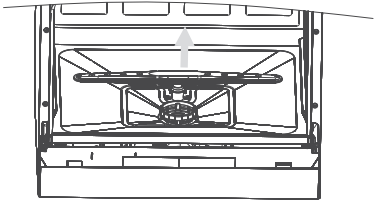
The spray arms can be easily removed for periodic cleaning of the nozzles, to prevent possible clogging. Wash them under running water and carefully replace them in their seats, checking that their rotary movement is in no way impeded. Grasp the middle of the spray arm, and pull it upwards to remove it. Wash the arms under a jet of running water and return them carefully to their seat. After reassembly, check that the spray arms turn freely. Otherwise, check that they have been installed correctly.
How to Keep Your Dishwasher in Shape
- After Every Wash
After every wash, turn off the water supply to the appliance and leave the door slightly open so that moisture and odors are not trapped inside. - Remove the Plug
Before cleaning or performing maintenance, always remove the plug from the socket. - No Solvents or Abrasive Cleaning
To clean the exterior and rubber parts of the dishwasher, do not use solvents or abrasive cleaning products. Only use a cloth with warm soapy water. To remove spots or stains from the surface of the interior, use a cloth dampened with water with a little vinegar, or a cleaning product made specifically for dishwashers. - When it is not needed for a long time
It is recommended that you run a wash cycle with the dishwasher empty and then remove the plug from the socket, turn off the water supply, and leave the door of the appliance slightly open. This will help the door seals to last longer and prevent odors from forming within the appliance. - Moving the Appliance
If the appliance must be moved, try to keep it in the vertical position. If necessary, it can be positioned on its back. - Seals
One of the factors that cause odors to form in the dishwasher is food that remains trapped in the seals. Periodic cleaning with a damp sponge will prevent this from occurring.
Installation Instructions
Installation Preparation
The installation position of the dishwasher should be near the existing inlet drain hoses and power cord. One side of the cabinet sink should be chosen to facilitate the connection of the drain hoses of the dishwasher.
Positioning the Appliance
Position the appliance in the desired location. The back should rest against the wall behind it, and the sides, along the adjacent cabinets or wall. The dishwasher is equipped with a water supply and drain hoses that can be positioned to the right or the left to facilitate proper installation.
About Power Connection
WARNING!
For personal safety:
- DO NOT USE AN EXTENSION CORD OR AN ADAPTER PLUG WITH THIS APPLIANCE.
- DO NOT, UNDER ANY CIRCUMSTANCES, CUT OR REMOVE THE EARTHING CONNECTION FROM THE POWER CORD.
Electrical Requirements
Please look at the rating label to know the rating voltage and connect the dishwasher to the appropriate power supply. Use the required fuse 10 amp, time delay fuse or circuit breaker recommended, and provide a separate circuit serving only this appliance.
Electrical Connection
Ensure the voltage and frequency of the power correspond to those on the rating plate. Only insert the plug into an electrical socket which is earthed properly. If the electrical socket to which the appliance must be connected is not appropriate for the plug, replace the socket, rather than using an adaptor or the like as they could cause overheating and burns.
GROUNDING INSTRUCTIONS
This appliance must be earthed. In the event of a malfunction or breakdown, earthing will reduce the risk of electric shock by providing a path of least resistance for the electric current. This appliance is equipped with a cord having an equipment-earthing conductor and an earthing plug. The plug must be plugged into an appropriate outlet that is installed and earthed by all local standards and requirements.
WARNING!
- Improper connection of the equipment earthing conductor can result in the risk of an electric shock.
- Check with a qualified electrician or service representative if you are in doubt whether the appliance is properly earthed.
- Do not modify the plug provided with the appliance. If the plug does not fit properly to the outlet, please have a qualified electrician to install a proper outlet.
Water Connection
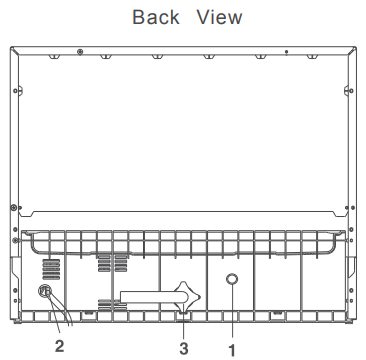
Rear of Dishwasher:
- Drain Port
- Power Cord
- Inlet Port
Your dishwasher comes equipped with a ‘quick connect’ assembly (includes inlet and drain hose). The faucet adapter must be installed on the faucet before you can connect the dishwasher. This adapter is included inside your dishwasher. The faucet adapter is compatible with faucets inclusive of either male (outside) or female (inside) threaded faucet connections.
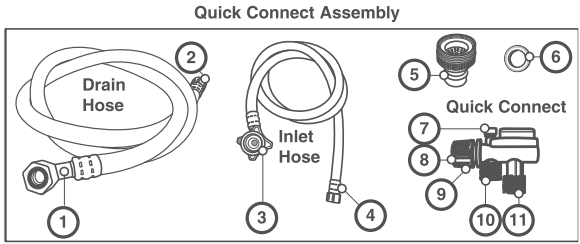
Quick Connect Assembly
- Drain port connection
- Quick connect connection
- Inlet port connection
- Quick connect connection
- Faucet Adapter
- Faucet washer
- Pressure relief valve
- Faucet adapter connection
- Locking collar
- Inlet hose connection
- Drain hose connection
WARNING!
To avoid that there is more water staying in the inlet hose, please close the faucet after use
- Screw the faucet adapter onto (or into) the faucet tap. Check for leaks (use Teflon tape to eliminate if necessary).
- Connect the six-sided connection of the drain hose to the drain port connection on the back of the dishwasher cabinet. Do not over-tighten (to avoid damage to threads).
- Connect the star-shaped connection of the inlet hose to the inlet port on the back of the dishwasher cabinet. Do not over-tighten (to avoid damage to threads).
- Connect the circular connection of the drain hose to the longer (bottom) male connection on the quick connect.
- Connect the circular connection of the inlet hose to the shorter (top) male connection on the quick connect.
- Attach the quick connect onto the faucet adapter, by pulling down the outer locking collar on the quick connect, while pushing the quick connect upward onto the faucet adapter.
- When the quick connect snaps onto the faucet adapter, release the locking collar. Verify the connection is secure.
- Slowly open the hot water line and check for any sign of water leaks at all hose connections. If leaks are located, immediately close the water supply and repair the hose connections.
Starting the Dishwasher
The following things should be checked before starting the dishwasher.
- The dishwasher is level and fixed properly
- The inlet valve is open
- There is a leakage at the connections of the conducts
- The wires are tightly connected
- The power is switched on
- The inlet and drain hoses are knotted
- All packing materials and printings should be taken out from the dishwasher
Troubleshooting Tips
Before Calling for Service
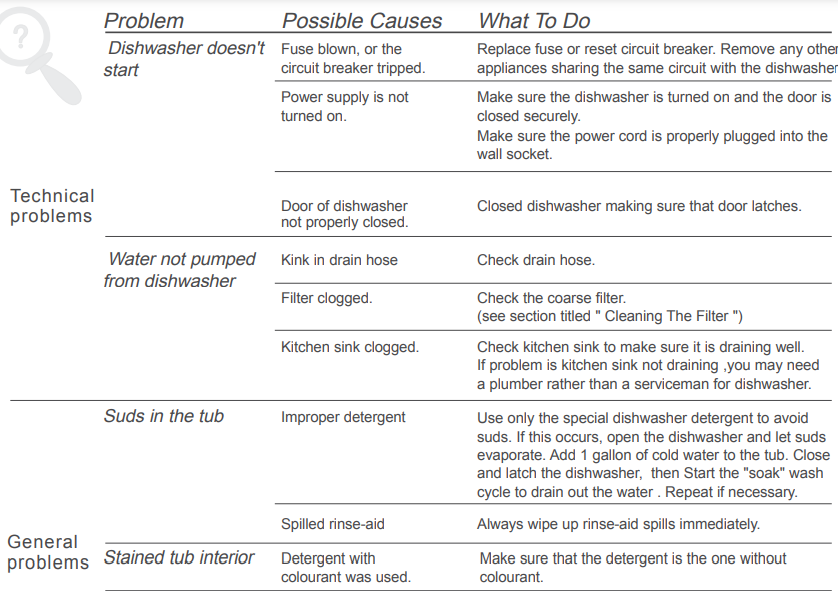
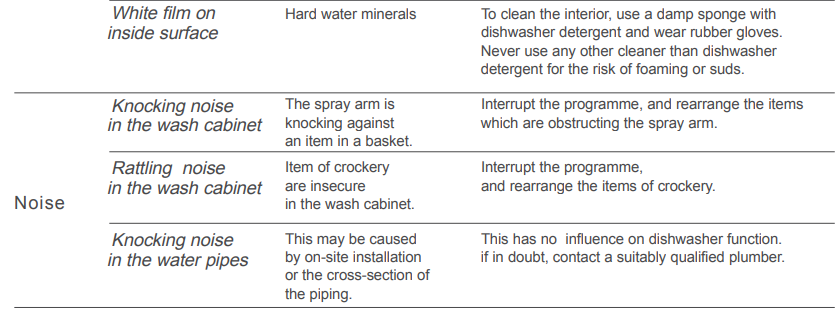
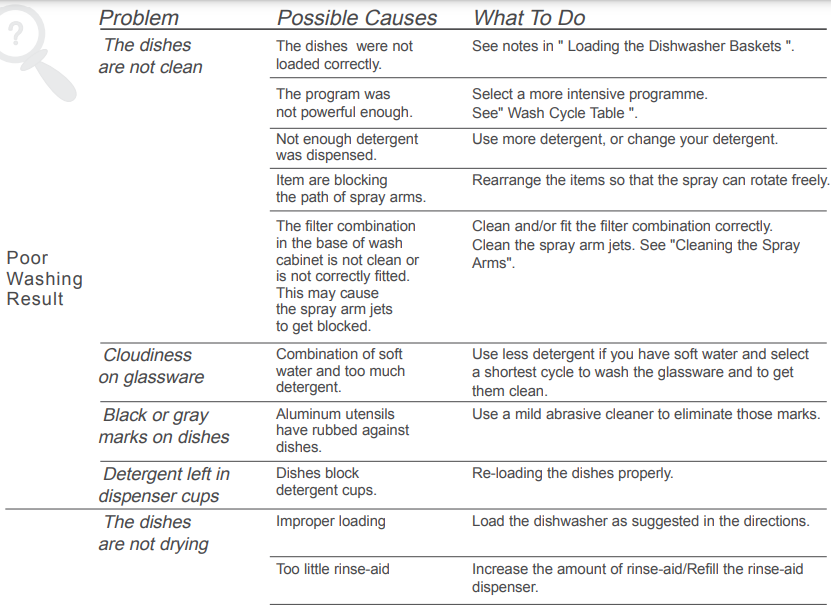

Error Codes
When some malfunctions come on, the appliance will display error codes to warn you:

Technical Information
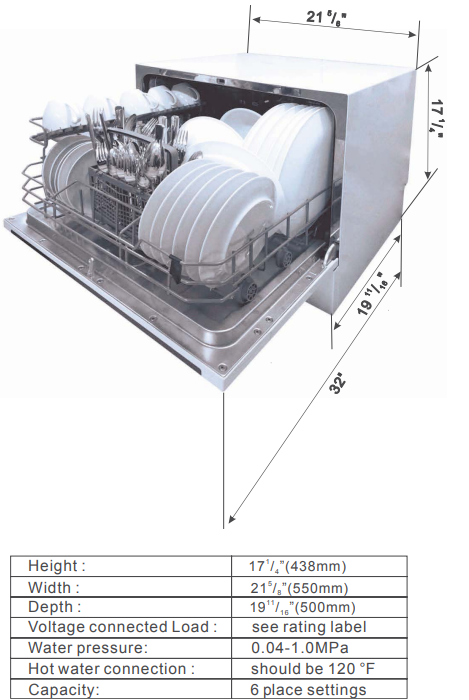
YEAR LIMITED WARRANTY
This is the only express warranty for this product and is instead of any other warranty or condition. This product is warranted to be free from defects in material and workmanship for one (1) year from the date of original purchase. During this period, your exclusive remedy is repair or replacement of this product or any component found to be defective, at our option; however, you are responsible for all costs associated with returning the product to us and our returning the product or component under this warranty to you. If the product or component is no longer available, we will replace it with a similar one of equal or greater value.
This warranty does not cover wear from normal use or operation that does not comply with the instruction manual or damages to the product resulting from accident, alteration, abuse, or misuse. This warranty extends only to the original consumer purchaser or gift recipient. Keep the original sales receipt, as proof of purchase is required to make a warranty claim.
This warranty is void if the product is used for other than single-family household use or subjected to any voltage and waveform other than as specified on the label We exclude all claims for special, incidental, and consequential damages by breach of express or implied salary warranty or condition of merchantability or is for a particular purpose, is disclaimed except to the extent prohibited by law, in which case such warranty or condition is limited to the duration of this written warranty.
This warranty gives you specific legal rights. You may have other legal rights that vary depending on where you live. Some states or provinces do not allow limitations on implied warranties or special, incidental consequential damages, so the foregoing limitations may not apply to you.
For more Manuals by COMFEE, visit ManualsDock
FAQS About COMFEE CDC22P1BBB Countertop Dishwasher
What are the dimensions of the COMFEE CDC22P1BBB Countertop Dishwasher?
The dimensions are approximately 21.65 x 19.69 x 17.72 inches (W x D x H).
How many place settings can it accommodate?
It can accommodate up to 6 place settings, making it ideal for smaller households or apartments.
What are the wash cycles available?
The dishwasher offers 6 wash cycles: Heavy, Normal, Eco, Rapid, Glass, and 90 Minutes.
Is it easy to install?
Yes, installation is straightforward. Simply connect it to a standard faucet with the included adapter and hose.
Does it require permanent installation?
No, it’s a portable countertop dishwasher, so it doesn’t require permanent installation.
Is it energy efficient?
Yes, the COMFEE CDC22P1BBB Countertop Dishwasher is Energy Star certified, ensuring efficient operation.
What types of dishes can it wash?
It can wash various types of dishes, including plates, bowls, glasses, and silverware.
How noisy is it during operation?
It operates at a relatively quiet noise level, making it suitable for use in open-plan living spaces.
Does it have a drying feature?
Yes, it has a built-in drying function to ensure your dishes come out dry and ready to use.
What warranty does it come with?
The COMFEE CDC22P1BBB Countertop Dishwasher typically comes with a standard manufacturer’s warranty, providing coverage for parts and labor for a certain period. Be sure to check the warranty details at the time of purchase.

